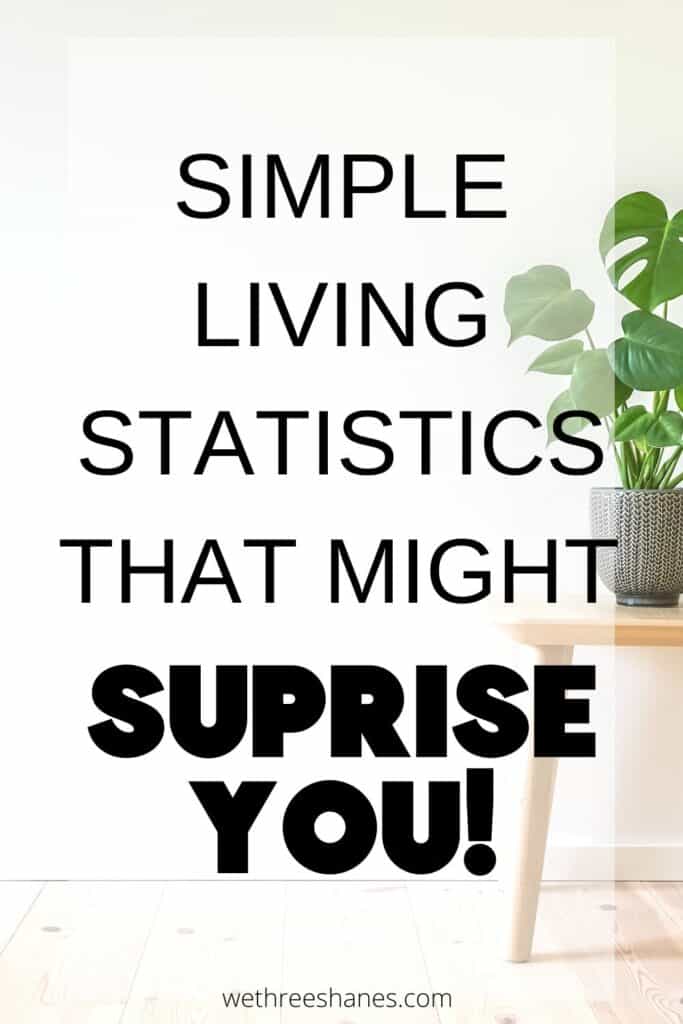19 Simple Living Statistics You Should Know
Have you thought about simplifying your life but aren’t sure if it’s worth it? These science-backed facts about simple living might convince you to finally take the plunge.

What is simple living?
Simple living is a lifestyle that encourages living with less stuff, consuming less, and producing less waste. It’s about creating a life that is sustainable and fulfilling, without all the excess.
And it turns out, this lifestyle is gaining in popularity. Simple living has become increasingly popular in recent years, as more and more people seek to downsize their possessions and simplify their lives.
I think you can learn the most about simple living by talking to someone who made changes in their life and has seen a difference. It’s fun to hear stories from people about the changes they made that helped them get out of debt, quit jobs they didn’t like, clear clutter from their homes, live with less, and spend more time with people they love.
But, I also love science backed statistics!
Though opinions on simple living may vary, the science behind it is pretty clear cut. Studies have shown that individuals who live simpler lives tend to be happier and less stressed than those who live more complicated lives. In addition, they also tend to be more productive and have more fulfilling relationships.
Here are a few simple living statistics that may inspire you to make some changes in your own life:
1. At the start of 2022, 64% of the U.S. population was living paycheck to paycheck – CNBC
2. Paycheck-to-Paycheck consumers are three times more likely to revolve credit card debt and carry higher monthly balances – PR Newswire
3. Americans spend $1.2 trillion annually on goods and services they don’t absolutely need. -Washington Street Journal
4. The average single family house in the United States has overall increased in size since 2000. It reached its peak of 2,467 square feet in 2015 before falling to 2,261 square feet by 2020 –Statista.com
5. It is estimated that the average American throws away about 81 pounds of clothes every year. –Calpirg.org
6. Food waste in our homes makes up about 39% of all food waste – about 42 billion pounds of food waste. -feedingamerica.com
7. Americans purchase about 50 billion water bottles per year, averaging about 13 bottles per month for every person in the U.S.! That means by using a reusable water bottle, you could save an average of 156 plastic bottles annually. -earthday.org
8. Experience means more than material possessions because they help shape us and become a part of us. You can really like material goods but they remain separate from you. -Under 30 Experiences
9. Studies have shown that social support—whether it comes from friends, family members or a spouse—is strongly associated with better mental and physical health. A robust social life, these studies suggest, can lower stress levels; improve mood; encourage positive health behaviors and discourage damaging ones; boost cardiovascular health; improve illness recovery rates; and aid virtually everything in between. -Time
10. People who take part in leisure activities have fewer negative emotions and are less stressed. The study even found that our heart rates are literally lower when we engage in our hobbies. – hbr.org
11. Americans spend most of our leisure time in front of the tv – an average of 2 hours, 48 minutes a day. -Nexa Learning
12. Daily time spent on social media in the U.S. is two hours and three minutes. -Statista.com
13. Experimental findings show how impressive nature’s healing powers can be—just a few moments of green can perk up a tired brain. -American Psychological Association
14. But, experts also say the key to enjoying downtime is to *not* over-schedule it. Taking the focus off productivity allows for more enjoyment of leisure activities. -theladders.com
15. In the ever-earlier scramble to develop their kids’ athletic skills, mothers and fathers frequently find themselves giving up the integrity of the family as a whole. – The Atlantic
16. If you do a lot of multitasking or task switching you can lose up to 40% productivity. –Psychology Today
17. It’s hard to focus on important tasks when several things compete for your attention. Researchers have found that being around disorganization makes it harder for your brain to focus. -WebMD
18. A growing body of evidence suggests that clutter can negatively impact mental well-being, particularly among women. Clutter can also induce a physiological response, including increased levels of cortisol, a stress hormone. -The New York Times
19. If everyone consumed as much as the average US citizen then you would need 4 earths to sustain everyone. -Global Footprint Network
We don’t have 4 earths people! This last fact really hit me. As someone who is trying to be better at shrinking my footprint on this earth I was thinking, well, at least I’m doing better at this. But it turns out I’m not doing much better.
You can use the ecological footprint calculator to see what your personal footprint on this plant is and mine was 2.9 earths. Needless to say, I’ll be working on more ways to decrease my footprint.
Simple Living Benefits
I find that it’s easy to get in this consumer cycle – we need to work hard to pay for our big homes and consumer habits, this makes our homes cluttered and our bank accounts small. We’re stressed out and have no time to relax. If we can learn to cut back on a lot of the unnecessary in our lives and slow down we’d be much happier.
Of course, there is no single definition of “simple living,” and what works for one person may not work for another. However, these science-based facts show that there are real benefits to simplifying one’s life.

So if you’re considering simplifying your life, know that you’re backed by science! There are plenty of good reasons to give it a try. So, if you’re looking for a way to improve your mental health and wellbeing, simplifying your life may be a good place to start.
What’s one change that you can make to start living a bit more simply? Let us know in the comments below!
